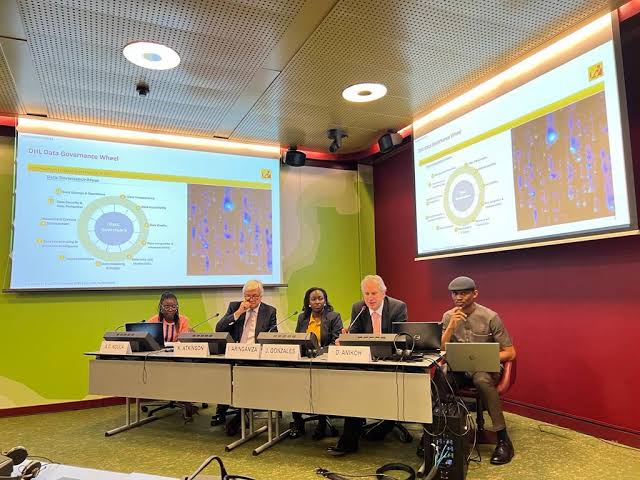Nigeria Customs Service (NCS) has highlighted the overbearing want for strong knowledge governance in growing nations.
The NCS canvassed this on the just-ended UNCTAD E-Week 2023 convention, held on the Centre Worldwide de Conférences de Genève (CICG).
A pivotal session hosted by the Nigeria Customs Service, represented by CSC DO Anikoh and CSC of Obieze, aimed toward fostering dialogue on adopting and implementing a Information Governance Framework aligning with worldwide finest practices.
The session introduced collectively specialists from the private and non-private sectors to debate the paramount points of accuracy, safety, and standardisation in knowledge governance.
DHL’s Steven Pope emphasised the need of stringent controls on knowledge sharing to stop misuse, whereas the Common Postal Union’s Javier Garcia harassed the significance of nationwide knowledge governance frameworks aligning with world provisions.
The great dialogue lined numerous essential aspects, together with honest compensation for knowledge analysts, the position of information analysts in specialised businesses, addressing knowledge high quality and integrity, challenges confronted by startups in accessing actual knowledge, and the alternatives and challenges of accessing non-public firm knowledge for policy-making. Worldwide regulation to stop knowledge misuse emerged as a key theme.
The consensus from the dialogue underscored that knowledge governance is prime to digital transformation.
Creating nations have been urged to handle knowledge on a macro, regional, and worldwide stage.
The session emphasised the very important position of information sharing and usefulness between the non-public sector and regulatory establishments, addressing privateness and safety considerations whereas selling sustainable improvement and mutual profit.
Implementing knowledge governance insurance policies within the non-public sector was essential for gaining belief, establishing pointers, and balancing privateness with innovation, and the session known as for presidency help and awareness-raising about knowledge governance insurance policies.
For e-commerce provide chain companies, knowledge governance was recognised as important to scale back dangers and guarantee knowledge accuracy, and it entails understanding knowledge construction, defending accessed knowledge, and utilizing requirements and expertise.
Authorized frameworks, just like the USMCA in Latin America and Non-Disclosure Agreements (NDAs), have been highlighted as vital to stop unauthorised disclosure.
The dialogue emphasised that knowledge storage is a world challenge for businesses, and knowledge governance streamlines administration, bettering effectivity. Authorities and regulatory businesses have been urged to adapt to altering knowledge governance, particularly cellular cash and e-commerce knowledge methods.
A sturdy knowledge governance system, balancing standardization, harmonization, and simplification, was deemed essential. Facilitating cross-border knowledge flows was mentioned, with higher-level requirements just like the GDPR seen as useful, though considerations about non-uniform requirements have been acknowledged.
The session concluded with a suggestion for regulatory establishments in growing nations to undertake knowledge governance frameworks or search help from worldwide our bodies just like the WTO and WCO to encourage accountable knowledge sharing with non-public stakeholders.
The overarching message was clear; strong knowledge governance is paramount for navigating the complexities of the digital period, selling financial development, and guaranteeing a good, safe, and mutually useful world knowledge panorama.
